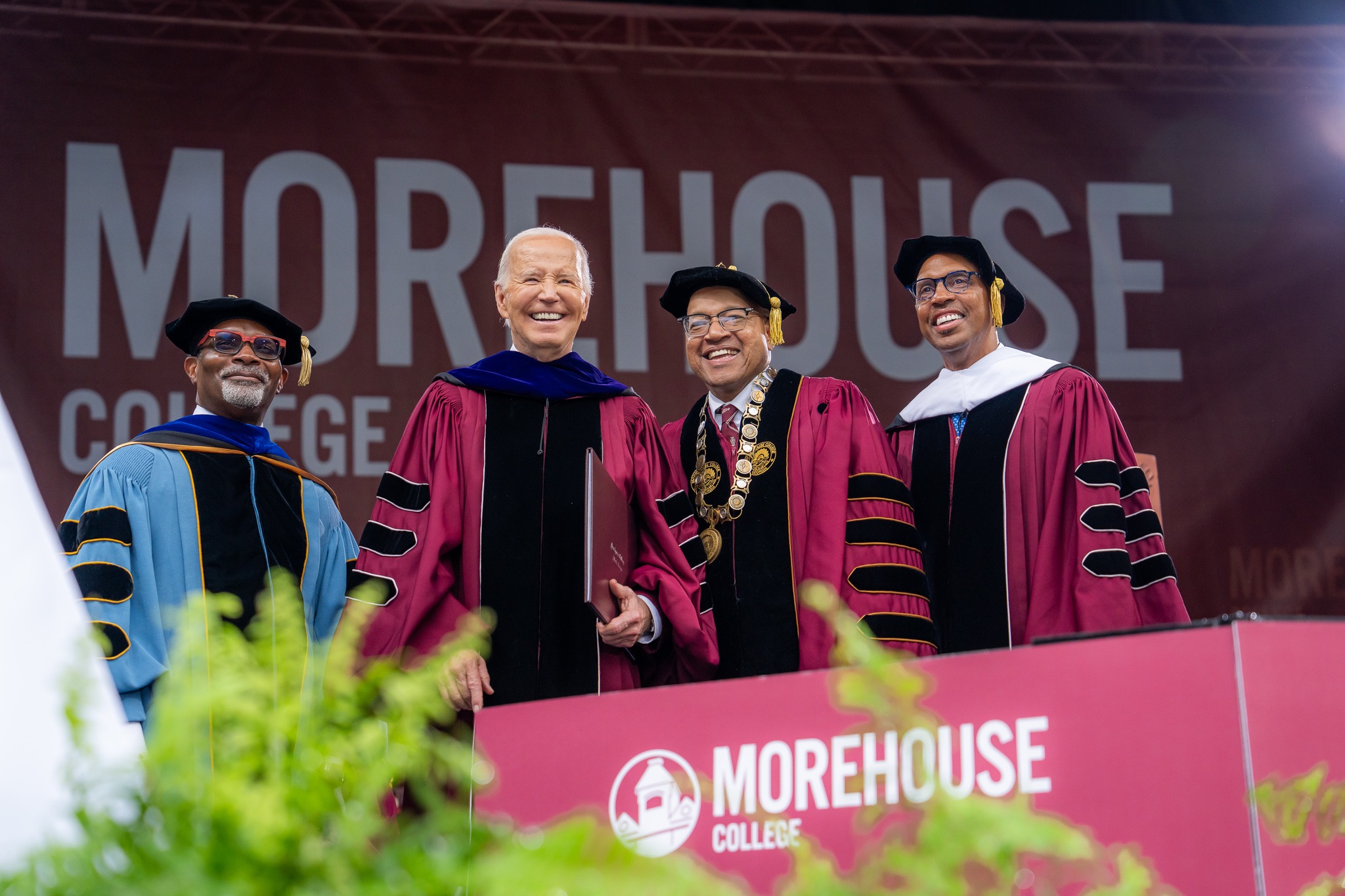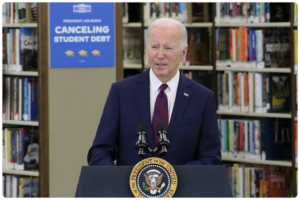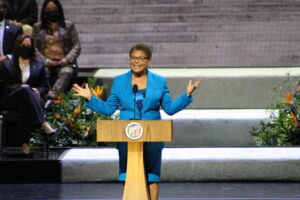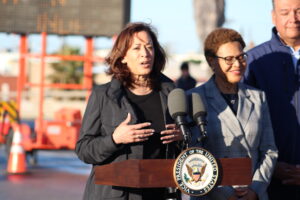President Biden Speaks at Morehouse College Commencement while in Atlanta, Georgia. The President also received an Honorary Doctorate from the prestigious, men’s college founded in 1867. Earlier in the week, he met with the families that set the precedent for Brown 🆚 the Board of Education of Topeka, Kansas on the 70th anniversary since the Supreme Court decision and the Little Rock Nine of Arkansas that represented the desegregation of public schools in the United States.
Meanwhile, the Biden-Harris Administration announced a new record in Federal funding and investments in Historically Black Colleges and Universities (HBCUs) totaling more than $16 billion from Fiscal Years (FY) 2021 through current available data for FY 2024. This new reported total is up from the previously announced over $7 billion, and captures significant additional actions already undertaken. The total of more than $16 billion includes over $11.4 billion between FY2021 and FY2023 through Federal grants, contracting awards, and debt relief for HBCUs; over $4 billion between FY2021 and FY2023 for HBCU-enrolled students through federal financial aid and educational benefits for veterans; and, so far in FY 2024, over $900 million has been secured for Department of Education programs strengthening HBCUs as institutions. President Biden and Vice President Harris are committed to ensuring whole-of-government investment efforts in HBCUs continue at full momentum through the rest of FY 2024.
These historic funding levels demonstrate the Administration’s ongoing commitment to HBCUs, which serve as an engine for upward economic mobility in our country. The Administration is also focused on work to ensure HBCUs have the resources to provide a high-quality postsecondary education.
For more than 180 years, HBCUs have been advancing intergenerational economic mobility for Black families and communities, developing vital academic research, and making our Nation more prosperous and equitable. Despite representing only 3% of colleges and universities, HBCUs play an outsized role to support the economic mobility of African Americans, producing 40 percent of all Black engineers, 50 percent of all Black teachers, 70 percent of all Black doctors and dentists, 80 percent of all Black judges, and the first woman and Black Vice President of the United States. Overall, HBCUs greatly contribute to the economic success of America, providing college access to twice as manyPell Grant-eligible (low-income) students as non-HBCU institutions. Additionally, social mobility research by the United Negro College Fund finds that HBCUs support nearly five times more students than Ivy League and other top-ranked institutions in facilitating movement from the bottom 40% in U.S. household income to the top 60%.
A CEA report published today further underscores that HBCUs are engines for upward mobility and additionally discusses new research showing that HBCU enrollment has considerable positive effects on bachelor’s degree completion and household income later in life. The report details how these successes have occurred in the context of historic underfunding of HBCUs. It also discusses a recent resurgence in applications to, and enrollment in, HBCUs which highlight the high value that students have placed on these institutions in recent years.
Since Day One, the Biden-Harris Administration has committed to advancing racial equity, economic opportunity, and educational excellence, including by reestablishing the White House Initiative on Advancing Educational Equity, Excellence, and Economic Opportunity through Historically Black Colleges and Universities. Between FY 2021 – FY 2023 the Biden-Harris Administration has taken historic actions to support HBCUs:
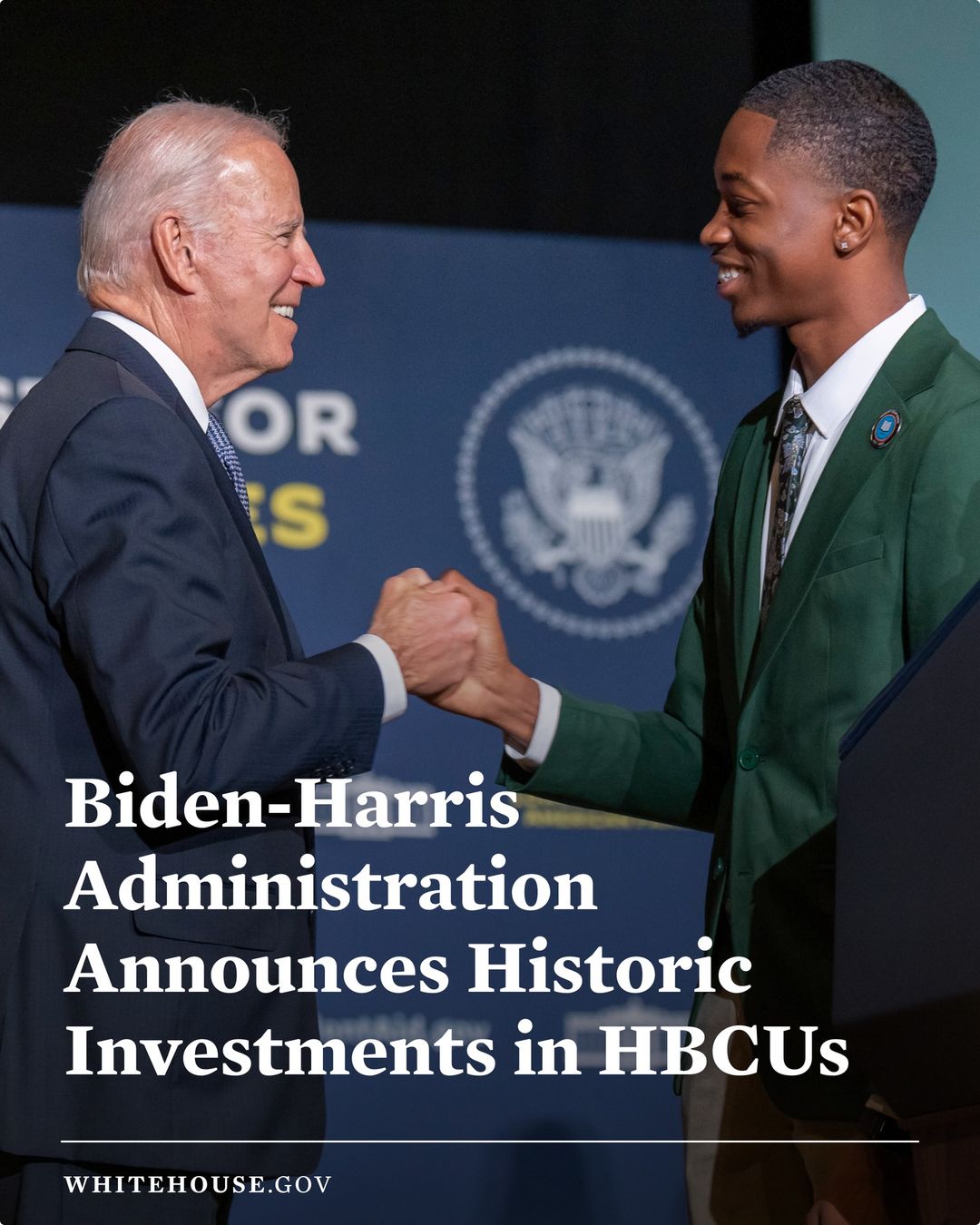
Invested over $11.4 billion in HBCUs, which includes:
- Nearly $4 billion for HBCUs through the American Rescue Plan and other COVID relief legislation. These grants funded through the Department of Education and other agencies have helped HBCUs support students’ ability to meet basic needs; support campus operations, staffing, teaching, and educational programs; and keep campuses and the surrounding communities on the path to an equitable recovery;
- $2.6 billion from the Department of Education to build institutional capacity at HBCUs. These efforts support the growth and sustainability of HBCU degree programs; increase and enhance human, technological, and physical infrastructure for research; strengthen positioning to secure direct partnership opportunities; and create sustainable fund development;
- Over $1.6 billion to HBCUs through Federal grants, cooperative agreements, and other competitive funding opportunities that drive the advancement of academic and training programs, community-based initiatives, and research innovation across national priorities such as medicine and public health, climate science, agriculture, emerging technologies, and defense;
- Almost $950 million to support HBCUs in growing research capacity and related infrastructure to better compete for Federal research and development dollars;
- Nearly $719 million in grant funding to expand STEM academic capacity and educational programs; and in other high-wage, high-demand fields such as computer science, nursing, and allied health;
- Over $150 million in Federal contracting opportunities awarded to HBCUs, including for research and expansion of STEM education programs at the Department of Health and Human Services, Department of Transportation, Department of Energy, and U.S. Agency for International Development;
- $1.6 billion in capital finance debt relief for 45 public and private HBCUs. Discharging these debts has enabled these institutions to focus resources on supporting students, faculty, and staff while recovering from the COVID-19 pandemic; and
- Over $2.4 million in Project SERV funds to support HBCUs affected by more than a dozen bomb threats in 2022. These grants have helped restore safe learning environments and invest in student mental health and well-being for students.
In addition to the over $11 billion provided to HBCUs, the Biden-Harris Administration has provided over $4 billion to support the success of HBCU-enrolled students through:
- $2.8 billion in need-based grants and other Federal programs, including Pell Grants, Federal Work-Study and Supplemental Educational Opportunity Grants, to assist HBCU students in affording a postsecondary education; and
- Nearly $1.3 billion to support Veterans attending HBCUs through the GI bill and other college, graduate school, and training programs delivered through the Department of Veterans Affairs.
- The Department of Defense U.S. Air Force established the first-ever HBCU-led University Affiliated Research Center (UARC). Led by Howard University with seven other HBCUs and funded at $90 million over five years, efforts will focus on advancing the deployment of autonomous technologies for Air Force missions. Participating schools include Jackson State University, Tuskegee University, Hampton University, Bowie State University, Norfolk State University, Delaware State University, Florida Memorial University, and Tougaloo College.
- The Department of Commerce established the first-ever Connecting-Minority-Communities program delivering funding for 43 HBCUs to purchase broadband internet, purchase equipment, and hire IT personnel to tackle the digital divide impacting HBCUs. Several HBCUs also recently launched an HBCU CHIPS Networkin collaboration with Georgia Institute of Technology to increase the coordination of the resources at the colleges and universities and jointly contribute to workforce development needs of the semiconductor industry. Chips are critical in powering our consumer electronics, automobiles, data centers, critical infrastructure, and virtually all military systems.
- The Department of Commerce National Oceanic and Atmospheric Administration will provide $4.2 million in grant funding to HBCUs, through the EPP/MSI Cooperative Science Center program.
- The Department of Agriculture announced a $262.5 million investment to support 33 projects across U.S. institutions of higher education designed to train the next generation of diverse agricultural professionals. Through the USDA NextGen program, the projects are led by 1890 land-grant institutions (historically Black land-grant universities), 1994 land-grant institutions (Tribal Colleges and Universities, Alaska Native-Serving Institutions and Native Hawaiian-Serving Institutions, Hispanic-Serving Institutions), and institutions of higher education located in the Insular Areas. This historic investment will provide training and support to more than 20,000 future food and agricultural leaders through 33 projects executed by more than 60 institutions across 24 states and Insular Areas.
- The Department of Energy announced the inaugural $7.75 million Historically Black Colleges and Universities (HBCU) Clean Energy Education Prize, a competition that will support HBCUs in developing programming to strengthen the participation of K-12 and community college students in science, technology, engineering, and math (STEM) fields. The competition, which has announced its first 10 winning HBCU teams, is supporting the creation of clean energy community networks to inspire the next generation of students to work in STEM fields related to clean energy.
- The Department of Education provided nearly $25 million to HBCUs under the Research and Development Infrastructure program to transform their research infrastructure, including strengthening research productivity, faculty expertise, physical infrastructure, and partnerships leading to increases in external funding.
- The Department of Transportation announced Prairie View A&M University in Texas as the first-ever HBCU to lead a University Transportation Center. Prairie View A&M and 11 other HBCUs were among 34 schools to receive a portion of a $435 million grant for development of interoperable technology systems, which allow equipment, software, and applications to work together, communicate, and exchange data.
- The National Aeronautics and Space Administration is pioneering efforts to close opportunity gaps in STEM, including nearly $12 million for eight HBCUs to support programs in artificial intelligence and machine learning and create a more diverse pipeline of talent for careers in data-intensive space-based Earth science.
- The White House Initiative on Advancing Educational Equity, Excellence, and Economic Opportunity through HBCUs established the Executive HBCU Space Lab, a new collaboration between HBCUs, the Federal government, and industry partners to increase HBCU engagement in space-related federal contracting. The Executive HBCU Space Lab is a solutions-oriented initiative that will release resources including SpaceTechConnect, a free platform to highlight space-related capabilities at HBCUs.
- The Department of Health and Human Services National Institute of Environmental Health Sciences established HBCU-Connect, a new initiative with HBCUs to inspire the development of environmental health science leaders from diverse backgrounds. HBCU-Connect is a multifaceted effort to strengthen ties between the institute and faculty and students at academic institutions that are often underrepresented in the sciences.
- The Department of Health and Human Services Health Resources and Services Administration’s Maternal and Child Health Bureau launched the Maternal Health Research Collaborative for MSIs, providing roughly $30M in research support to seven HBCUs over five years. The funding will build capacity of HBCUs to conduct Black maternal health research to fully understand and address the root causes of disparities in maternal mortality, severe maternal morbidity, and maternal health outcomes; and to find community-based solutions to address these disparities and advance health equity.
- The Department of Health and Human Services National Institutes of Health funding to HBCUs totaled $147.5 million to support research, training, research capacity building, and outreach efforts. NIH funding included endowment awards to strengthen the research infrastructure of the HBCU award recipients to conduct minority health and health disparities research. Other NIH funding has assisted several HBCUs in contributing towards building a diverse scientific workforce, including mentorship and student training programs and career development opportunities for faculty.
- The National Science Foundation launched Advancing Research Capacity at HBCUs through Exploration and Innovation (ARC-HBCU) to support participation in an intensive, facilitated workshop that brings together HBCU faculty, staff, research administrators and academic leadership focused on exploration of innovative and promising approaches for addressing the research capacity needs of HBCUs.
- The National Science Foundation, as part of Growing Research Access for Nationally Transformative Equity and Diversity (GRANTED) initiative, awarded an Atlanta-based HBCU consortium a $14 million competitive grant to establish a hub that promotes equity in the national research ecosystem and serves as a model for other HBCUs and emerging research institutions. The consortium includes Spelman College, Morehouse College, Morehouse School of Medicine, and Clark Atlanta University.
- The National Science and Technology Council’s Committee on STEM, in support of the CHIPS and Science Act, established an Interagency Working Group (IWG) on HBCU, TCU, and MSI STEM Achievement. The Council provides a coordinated federal approach to carry out sustained outreach activities to increase clarity, transparency, and accountability for federal research agency investments in STEM education and research at HBCUs, TCUs, and MSIs, including such institutions in rural areas.
- The Department of Housing and Urban Development announced awards totaling $5.5 million for HBCUs to conduct housing and community development research to support the production of affordable housing, support homeownership, advance use of renewable energy, and address infrastructure inequity affecting underserved communities.
- The Department of Justice has increased both the number of HBCUs applying for grants and its HBCU approval rate. Over the past five years, DOJ’s grant awards to HBCUs have increased 83% (from $900,000 in FY18 to $5.2 million to HBCUs in FY23).








